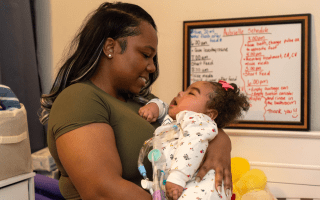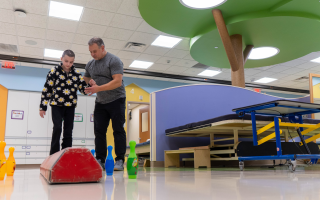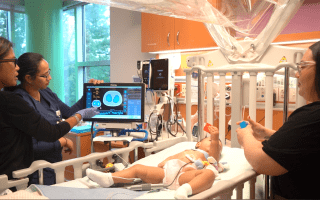Malka on the Move
When eight-year-old Malka arrived at Blythedale last October, she was a trailblazer in her own right.
Malka was born with dilated cardiomyopathy, a condition in which the heart's ability to pump blood is decreased because the heart's left ventricle is enlarged and weakened. Despite her previously undiagnosed condition, she was able to function typically until last spring when her condition quickly deteriorated and she was admitted to NewYork-Presbyterian Morgan Stanley Children’s Hospital.
“Malka was diagnosed with cardiomyopathy sometime in June and her heart failure worsened in August,” said Sandy, Malka’s mother.
She needed a new heart. So, to keep her alive until one could be found, doctors performed lifesaving surgery on Malka and implanted an LVAD in her chest.
“The device is a helper; an artificial pump that takes over for the functioning of the heart,” said Dr. Sabrina Law, Medical Director of Pediatric Ventricular Assist Device Program at NewYork-Presbyterian/Columbia University Irving Medical Center. “Blue blood goes back to the right side of the heart, it goes to the lungs, picks up oxygen, then that lovely pink blood goes into the LVAD and it is pumped back into the body.”
The device was successfully inserted but during the procedure Malka suffered another medical setback - a stroke. The stroke impacted her cognitive abilities, self-care skills and ability to walk.
“We were told Malka needed rehab to get as much of her function back as possible,” said Shlomo, Malka’s father. “With strokes, it’s impossible to know what the future holds, but we did know one thing… if we wanted a chance at recovery, we needed a dedicated place for rehab and Blythedale was the first that said “yes” to the LVAD.”
New York-Presbyterian Morgan Stanley Children’s Hospital referred Malka to Blythedale when she was medically stable from a cardiac perspective, so she could begin intensive rehabilitation. She was seamlessly transferred and admitted to Blythedale in October.
“It’s our first time taking an LVAD here (at Blythedale) but it’s also New York-Presbyterian Morgan Stanley Children’s Hospital’s first time transferring a pediatric patient with an LVAD to a post-acute facility,” said Jill Wegener, Blythedale’s Chief Nursing Officer. “
Weeks before Malka arrived, Blythedale’s medical and nursing staff underwent extensive training on the LVAD with the help of an educator and medical team from New York-Presbyterian Morgan Stanley Children’s Hospital.
“They (NewYork Presbyterian-Morgan Stanley Children’s Hospital) were really very supportive as far as availability of resources to help train us,” said Kara Dyer, Blythedale’s Nursing Director for the Pediatric, Adolescent & Traumatic Brain Injury Unit. “It was very exciting for our staff, and they, in turn, were encouraged that we challenged them to take on something new. It gave them a lot of confidence that we believed in them so much.”
Melissa Shemek, Blythedale’s Director of Nursing Education, also spoke of the customized training that went into preparing for Malka’s care.
“Having our first LVAD patient was really a way for our nursing staff to step up in regards to the specialized training and skills involved,” Shemek said. “We are really unique in that there is no other facility like Blythedale that really caters to the child and their specific needs quite like we do.”
Malka’s multidisciplinary team, and the success of their proactive approach in managing her care soon became evident to her parents.
“It’s amazing because she’s walking, talking much better, and started using her right hand, “said Sandy, Malka’s mom. “The nurses here are great; dedicated and like family.”
Physical, occupational, speech and music therapies became part of Malka’s new routine at Blythedale while she and her family wait for a new heart. And, amid the anticipation, the now nine-year-old girl has made significant physical and emotional gains.
“Conditioning her body and spirit for this major surgery really helps maximize her potential, and, hopefully, we can work the magic on the other end, post-transplant,” said Wegener. “Blythedale is truly about not looking at a child with a disability, but as a child with possibilities.”
Looking toward the future of this LVAD patient collaboration between Blythedale and NewYork-Presbyterian Morgan Stanley Children’s Hospital, Dr. Law is enthusiastic.
“I think it really does take a village to care for these patients and it’s very uplifting for us to see how much care goes into each one,” she said. “I think this is a partnership that can serve many, many children.”
As for what lies ahead for Malka, her father’s viewpoint has been transformed during their time at Blythedale.
“I had little hope, but now, seeing the long way she’s come and seeing the other children in Blythedale today, I believe,” he said.



